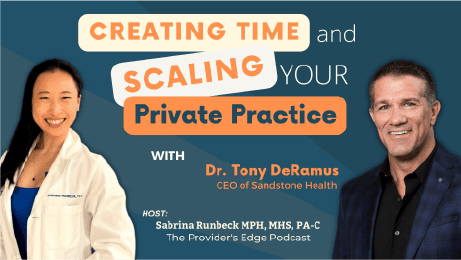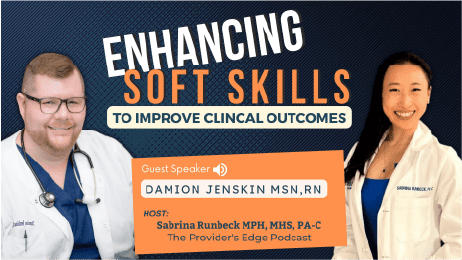
Building Resiliency
to Refuel, Recharge and Reclaim What matters
Good communication is the key to emotional resilience because it fosters positive emotions instead of negative ones. Learning how to communicate sincerely and clearly can help you avoid problems before they start.In this episode, we talked about communication by how we understand each other and what we listen to.It’s about time that you learn the vital points of how to communicate in a sincere manner with your clients, team members, or even your loved ones.Our feature guest today is Eileen McDargh, an award-winning book author, recognized keynote speaker, and executive coach who has been ranked as the Top 30 Communication Professional in the world, both in 2020 and 2021 by the Global Gurus International. She's also a British-based Provider of Resource Leadership, Communication, and Sales Training.She shared her experience about how organizations and individuals can transform the life of their business, and the business of their lives through conversations that matter and connects.Are you ready to build resiliency to refuel, recharge, and reclaim what matters through sincere communication?Subscribe ? and listen ?to this episode now❗To connect with Eileen McDargh CSP, CPAE find her links below:Eileenmcdargh.comeileenmcdargh.com/sign-up-for-the-resiliency-report Thank you again for joining us today!We love to hear your feedback. Send me your stories or question here: SabrinaRunbeck.com/Connect We are here to support you, so let us know how we can further uplevel your success!Practice owners, are you interested in being a guest on the show? Apply here: Calendly.com/SabrinaRunbeck/PreInterview
Listen anywhere you get your podcastin' on.
Good communication is the key to emotional resilience because it fosters positive emotions instead of negative ones. Learning how to communicate sincerely and clearly can help you avoid problems before they start.As healthcare practice owners, you give advice and instructions, and listen to your patients and teams about their concerns. Many of these topics are tough to handle. Therefore, the crucial part in these interactions is how are you understanding each other?Today’s article is a summary from our recently published podcast interview, where you will learn how to build resiliency through sincere communication.
Practice Active Listening
There’s a difference between hearing and listening.It’s easy for us to get lost in our thoughts and it can be hard to remember what people are trying to say. That’s why active listening is a vital part of being an effective healthcare provider.It's not just about convincing your clients or patients that your ideas are right for their needs, but rather finding out how you can help to build trust with patients. This way they will drop their guards and feel comfortable telling their concerns and setbacks as you work together towards achieving success!Having the ability to reflect on what you’re hearing is a real skill, and it’s something that many people struggle with.You can't hear what people are saying if you never listen, and that's why it’s important to reflect on everything they tell us. We all want someone who will take the time for us – to get our thoughts across the way we see them.So it's not about saying, "Take five pills and go home and call me in the morning". It's trying to understand what might be the objections or fears of your patients. Some of this resistance is the vaccination against COVID-19 which some people are afraid of. You need to talk about what makes them concerned and find out if there’s anything reasonable behind these fears. There are many reasons why some people may resist vaccinations. Some of this resistance is due to fear of the unknown, while others are health history. The key to better patient care is understanding what a person needs and how they feel. It’s important not just to say things, but to listen too to make sure that your patients feel heard and not lecture.
Know Your Value and Who You Are
Patient-centered care is a part where patients are involved in their care. They should not feel restricted but should be supported. To create trust, you need to understand their situation and all their fears.
Learn what’s their idea of a perfect outcome that they want to see six months or a year from now. Create a connection with your patient where they can feel like you want to be with them and they can trust you enough. They need to see that you want to take care of them and not just a process for you.
When we do the numbers game like how many hours you can see a patient, they might be there in one month with you, but when they find somebody else who will listen and pay attention to them – they're out of there! So short-term looks like you’re just cranking it up, but as a Healthcare Professional, you need to check off the numbers and focus on the care that you need to provide.
Listen to yourself and find out what is it that you want?
What's the value of it to you as a person? As a healthcare provider? So if you’re in that shoes, then you’re no longer chasing numbers.
You need to have a long-term vision for that patient or family that will continue to come back to see you. It's not about seeing them one time, and they're gone. If we’re playing the short-term game in our long-term game, we'll miss out on a lot more opportunities.
Understand That You Need To Reach Out
During the pandemic, it's hard to have a social life because we cannot see each other in person. But you need to think outside the box on ways that you can communicate.You can still be proactive through calling or texting. Do not wait for someone to reach out to you but make the point already. You can even reach out to your college best friends who you haven’t seen for years by making a zoom call or video chat.We are indeed all busy, but there’s a way to reach out.How are you supporting your family, friends, and also your team? Don’t rely on the system and see where your revenue goes. Remember that we’re still human behind all these processes.When you’re meeting with a person, ask them what happened last weekend or what’s their favorite vacation place. Have conversations first before you get into the nitty-gritty. The whole thing about burnout to break through is that you need those relationships because loneliness can be deadly.It’s not because of your great title, or you’re a subspecialty doctor, or simply because you’re healing people that they come to you. We still have to be able to reach out and have that specific message that connects with people.It’s learning to show up and not just say I am here. It’s how you appear to other people that they automatically want to attract to you like a magnet.First, you need to know your value and who you are. And then you can act in that way instead of chasing by number and feeling the pressure about the system.Then, understand that we have to reach out. The way of active listening is not just listening to what other people say, but you need to be able to ask questions. What are the barriers? What do they want? What else do you feel like in this leadership position as a Healthcare Professional that you see could be optimized?Know what your intention is.
Conclusion
Listen not to respond but to learn more. No one has the answers, because the answers are among all of us. You’ll find new ways to deliver some of the services that you do when you engage more with your team or colleagues. You don’t have to have all the answers, you just have to think very creatively.Be curious about what’s going on out there? What’s the other person is going through? It's not really about solving the problem and judging the whole situation, it’s about you’re here to learn about it and so on. You become someone who positions yourself in the presence of learning and does not start judging what’s right or wrong.As part of communication, you need to simply be yourself and share things without feeling judged or questioned. You need to be comfortable to say this is me, and comfortable enough to figure out how you can solve whatever you have going on.Want to hear detailed explanations and see some real life examples how this applies to healthcare leaders? Subscribe ? and listen ? to this episode now❗We are here to support you, and help you elevate your success as a healthcare leader and practice owner.Reach out to Eileen McDargh CSP, CPAE at eileenmcdargh.com and eileenmcdargh.com/sign-up-for-the-resiliency-reportReach out to me at SabrinaRunbeck.com/Connect
Recommended Podcast Episodes
Ep 55
Embracing Food Identify:Healing modern-day gut issues through traditional healing foods with Dr Sara
Be a guest on our show
Powerful and Passionate Healthcare Professionals Podcast is always looking to feature healthcare private practice owners to highlight their work and their stories.
Together, we can encourage other practitioners to up level their practices.If you or someone you know could be a good fit as a guest on the show,please click on the bottom below to apply as a speaker.
Healthcare Private Practice Owners
I can help you run a peak performance team while gaining you a day per week!After overcoming burnout working in surgery, I went back to my roots in neuroscience and public health helping healthcare practice owners and their teams to develop mental immunity so they can do less, achieve higher, and enjoy more.My clients stop having endless to-do lists, constantly putting out fires, or are not able to move steadily forward.If you want to gain a day per week and increase your team’s productivity... then you have landed on the right page, with the right consultant who is also a recovered clinician.




